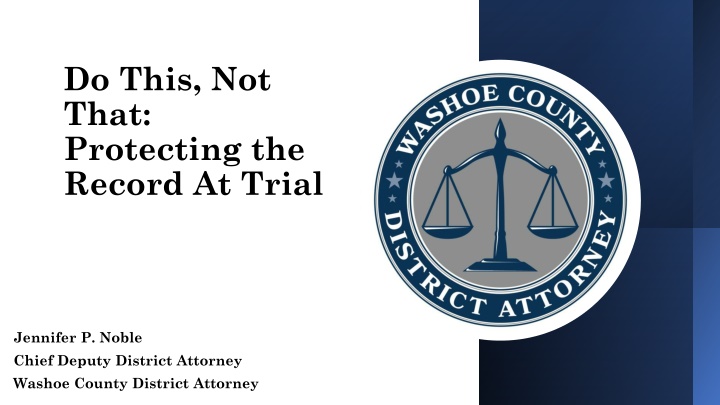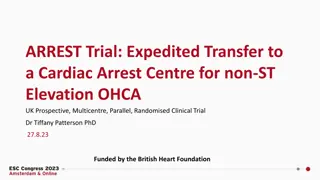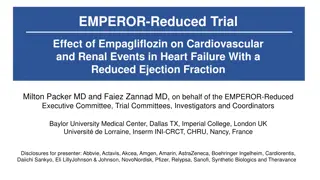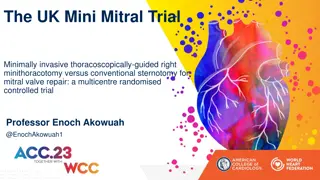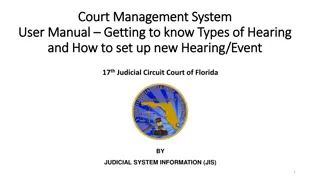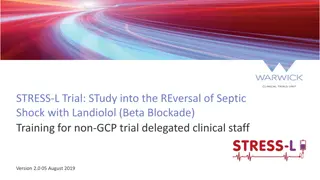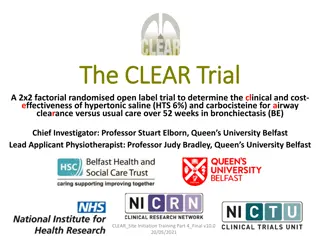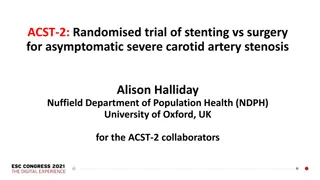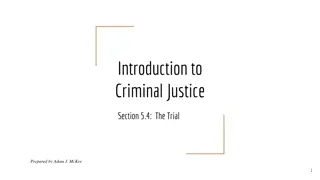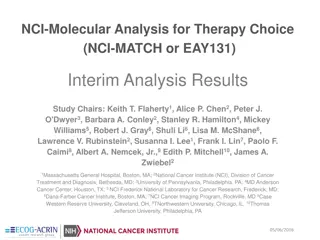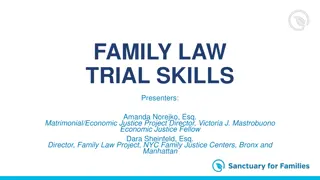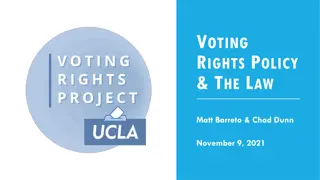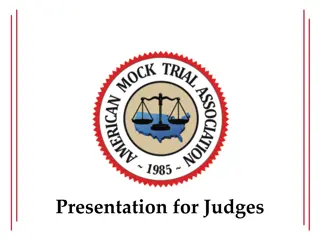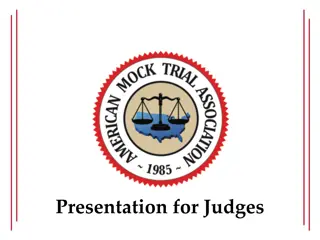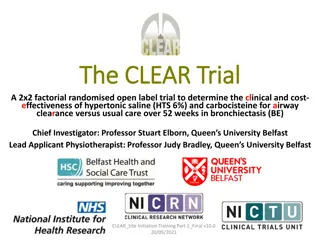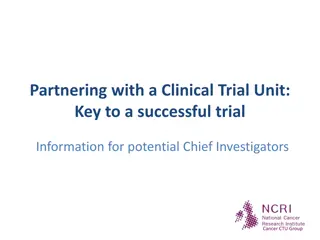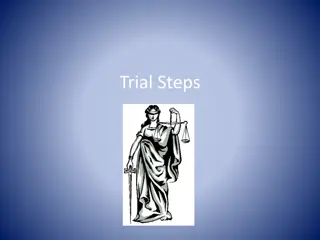Effective Strategies for Protecting the Trial Record
Learn essential tips for preserving the trial record, including insights on the prosecutor's duty, Nevada Supreme Court's review of misconduct, examples of prosecutorial errors to avoid, and guidelines on handling sensitive jury arguments to uphold justice and due process rights.
Download Presentation

Please find below an Image/Link to download the presentation.
The content on the website is provided AS IS for your information and personal use only. It may not be sold, licensed, or shared on other websites without obtaining consent from the author.If you encounter any issues during the download, it is possible that the publisher has removed the file from their server.
You are allowed to download the files provided on this website for personal or commercial use, subject to the condition that they are used lawfully. All files are the property of their respective owners.
The content on the website is provided AS IS for your information and personal use only. It may not be sold, licensed, or shared on other websites without obtaining consent from the author.
E N D
Presentation Transcript
Do This, Not That: Protecting the Record At Trial Jennifer P. Noble Chief Deputy District Attorney Washoe County District Attorney
A LOT CAN GO WRONG IN TRIAL. CONTROL WHAT YOU CAN.
A prosecutors primary duty is not to convict, but to see that justice is done.... while prosecutors may give no quarter in the presentation of the State s case, they must nevertheless steel themselves against inappropriate conduct stemming from the heat of battle, the vile nature of the crime or other stimuli. Williams v. State, 103 Nev. 106 (1987).
Understanding Nevada Supreme Courts Review of Alleged Misconduct Two steps: 1) Was the prosecutor s conduct improper? 2) Is reversal warranted? Where there is no objection, the Court reviews for plain error affecting the defendant s substantial rights, unless the error is one of constitutional dimension and defense objects. However, even misconduct not rising to plain error may result in a reversal under a cumulative error analysis.
Understanding Nevada Supreme Court Review of Alleged Misconduct Prosecutorial misconduct may be of constitutional dimension if involves impermissible comment on the exercise of a specific constitutional right, or if, in light of proceedings as a whole, so infected the trial with unfairness as to make the resulting conviction a denial of due process. If the error is of constitutional dimension, and the defense objects, the State must show beyond a reasonable doubt that the error did not contribute to a verdict. Otherwise, plain error review applies.
Examples of Prosecutorial Misconduct
Avoid Golden Rule Arguments. Don t ask the jury to place themselves in the victim s position, or in the victim s shoes. Lioce v. Cohen, 122, Nev. 1377 (2006); McGuire v. State, 100 Nev. 153, 157, 677 P.2d 1060, 1064 (1984). Don t ask the jury to imagine what the victim must have felt during or after the perpetration of the crime. Williams v. State, 103 Nev. 106 (1987); Quintana v. State, 486 P.3d 724 (Table), 2021.
Avoid Golden Rule Arguments. How embarrassing, first, to have to go through these acts, to have your father figure do these things to you. Imagine just how dirty it makes you feel. Draw v. State, 126 Nev. 706 (Table)(2010) He came in that house to load that shotgun and blow her away. It is that simple, and it's hard to talk about it in crude terms like that, ladies and gentlemen, and I will not tell you to put yourselves in Mrs. Jacobs' position looking down the barrels of this shotgun, because that would be improper. Jacobs v. State, 101 Nev. 356 (1985)
You can discuss the embarrassing/traumatic aspects of what victim underwent during investigation/trial in order to argue victim has no motivation to fabricate their story. Instead of Golden Rule Arguments: Without using you, tell the victim s story in a compelling, vivid way that allows the jurors to understand what the victim endured. Porter v. State, 498 P.3d 773 (Table)(2021)
Dont ask the jury to give the victim/community what it needs or to what the defendant give a killer what he deserves. Collier v. State, 101 Nev. 473, 479, (1985). Instead, during penalty phase, you can argue that our society values human life and the punishment should reflect those values. Witter v. State, 112 Nev. 908, 921 P.2d 886 (2011). Accountability Arguments: Argue that the facts of this case deserve the harshest available sentence. Hall v. State, 121 Nev. 1287 (Table)(2015).
Dont Say Defendant or Defense Witness Is Lying. Example: Officer Smith interviewed the defendant s alibi witness, and he could tell he was lying. Williams v. State, 103 Nev. 106 (1987) Example: repeatedly asking a witness during cross-examination whether they were mistaken or not truthful. Lopez v. State, 130 Nev. 1211(2014). Example: I'm telling you now this woman is lying for her husband. Rowland v. State, 118 Nev. 31 (2002). .
Dont Say Defendant or Defense Witness Is Lying. Instead, point out inconsistencies between the defendant s versions of events and the accounts of other witnesses. Pascua v. State, 122 Nev. 1001 (2006). You can demonstrate through inferences from the record that a defense witness s testimony is palpably untrue. Rowland v. State, 106 Nev. 1990 (1990). Exception: Where the defendant directly challenges the truthfulness of a witness during examination, you can ask if a witness is lying. My children also told police things that are not true. Moran v. State, 134 Nev. 985 (Table) (2018).
Instead of Calling Defendant a Liar: Call the jury s attention to inconsistencies between defendant s testimony v. the police interview, the evidence, etc. When discussing the testimony of the defendant/defense witness, remind the jury that they are to use their common sense during deliberations. United States v. Kojayan, 8 F.3d 1315, 1321 (9th Cir.1993)
Avoid Holiday Arguments. What he had in mind was not a date for dinner. It was a date for death. Happy Valentine s Day from Oscar to Toy with malice. Cupid uses arrows. Mr. Williams used bullets. Williams v. State, 103 Nev. 106 (1987). We know from his brother that holidays aren't the same anymore. Jones v. State, 124 Nev. 1483 (Table) (2008). There will be no more holidays the family spends with their daughter and their sister. Hollaway v. State, 116 Nev. 732 (2000).
Dont Comment Directly or Indirectly On Post- Arrest Silence/Failure to Testify: Example: saying that in the nine months after his arrest, the defendant failed to give police his version of events. Coleman v. State, 111 Nev. 657 (1995). Example: There's two people that know what happened, and [M.M.] told you what happened. She told you what he did to her. Gunara-Pastrana v. State, 137 Nev. Adv. Op. 29 (2021) Example: If [defendant] knows he's been wronged this entire time by these two cops, how come it never came out once? You know why, because he wasn't being wronged he was guilty and he knew it. Anderson v. State, 121 Nev. 511 (2005)
Dont Comment Directly or Indirectly On Post-Arrest Silence/Failure to Testify: If we have to speculate and guess about what really happened in this case, whose fault is it if we don't know the facts in this case? Harkness v. State, 107 Nev. 800, 803, 820 P.2d 759, 761 (1991).
Dont Comment Directly or Indirectly On Post-Arrest Silence/Failure to Testify: They don't have to say anything. They could just sit here and rap, rap, rap and complain about the bad law enforcement and fit their story to ours because we got to go first. You got to keep that in mind. How many times did Beverly Blair say different things? She was interrogated by Flud, I believe Adams, I believe the other people and she had some discrepancies. How many times was Aesoph interviewed? Any guesses? Zero. Aesoph v. State, 102 Nev. 316 (1986).
Dont Comment Directly or Indirectly On Post- Arrest Silence/Failure to Testify: Defendant had time in the field, she had time in the car, she had time on the way [to the police station], she had time while she was [at the police station], to explain all the things that she has presented to you today. She didn't do that. Not one of them. Deputy Elbert would listen to those. I think it's pretty clear that you would agree that Deputy Elbert would have listened to what she said and he would have given them weight accordingly. Angle v. State, 113 Nev. 757 (1993).
Dont Comment Directly or Indirectly On Post- Arrest Silence/Failure to Testify: PROSECUTOR: Did you ever relate to [your parole] officer any of what you've testified to today in this courtroom? NEAL: No, I did not. PROSECUTOR: At any time did you tell anyone, Detective Yaryan, Detective Oxhorn, Hunter, Mecham, anyone what happened? NEAL: At that time when the forty-eight hours were up, I was under arrest.1 No, I did not tell any officer anything. PROSECUTOR: Did you ever tell anyone in law enforcement what you told this jury? NEAL: No, I did not. Neal v. State, 106 Nev. 23 (1990)
Dont Comment Directly or Indirectly On Post- Arrest Silence/Failure to Testify: Murray v. State, 105 Nev. 570 (1989): During closing argument, the prosecutor suggested that the only reason Murray's story seemed at all credible was because Murray could remain silent during trial and listen to the testimony of other witnesses; then Murray could fabricate a story consistent with the other testimony before he had to testify.
Avoid Injecting Personal Opinions Regarding Guilt Don t tell the jury that a defendant could have been charged with additional, uncharged crimes. Hudson v. State, 502 P.3d 734 (Table)(Nev. App. 2022). There s no doubt he s guilty. This is a parent s worst nightmare. Make them feel better. Thank you. Pantano v. State, 122 nev. 782 (2006). Inviting jurors to feel good about convicting defendants who shoot police officers. Turner v. State, 136 Nev. Op. 62 (2020).
Dont disparage legitimate defense tactics or belittle defense counsel. Keep your eye on the ball. The defense is holding the ball in the dirt. They want you to be distracted from what the issue *898 is, look away from the crime that was committed. They want you to look back 20 years, as if somehow that mitigates what happened two years ago on the 4th of July. James Thurber said: You can fool most of the people all the time. Do not be fooled. What we have had here is a very creative argument. What we've had here this last week has been an infomercial: Buy this product. Butler v. State, 120 Nev. 879 (2004)
Dont disparage legitimate defense tactics or belittle defense counsel. Example: Telling the jury that a drug intoxication defense is a red herring. Pickworth v. State, 95 Nev. 547 Example: referring to as smoke and mirrors or as using smoke screens. Rose v. State, 123 Nev. 194 (2007).
Dont vouch for the credibility of The whole police force wants to bring something to light that they are so dirty they want this man right here they are willing to create such an elaborate, as she says, story? Big story that we write an ending to? If you want to believe that, then believe it I get a little upset about the fact that our police officers are being put up here and then told jurors are told that they are liars. That s basically what happened here. King v. State, 116 Nev. 349 (2000). your witnesses. Don t refer to your witness as a person of integrity and honor . Rowland v. State, 118 Nev. 31 (2002).
Dont vouch for the credibility of Instead, you can argue that witnesses are unbiased or have no motive to lie. This is proper because it does not place the prestige of the State behind the witness, but instead comments on the evidence presented. your witnesses. Bessey v. State, 133 Nev. 985 (Table)(2017)
Avoid Burden Shifting: Don t shift the burden of proof by commenting that the defendant has failed to present evidence supporting his theory of the case, or has failed to call a witness. The defense attorney has the capability of subpoenaing anyone he wants to. He could bring in those jail records. He could bring in Marcia Gaylord. Sure not my witness. Sure wasn t here to testify in this particular trial. Browning v. State, 120 Nev. 347 (2004).
Dont Any attempt to quantify the degree of proof needed to establish proof beyond a reasonable doubt is impermissible. Milligan v. State, 101 Nev. 627 (1985). Quantify or Analogize Reasonable Doubt: Having 90-95% of the pieces of a puzzle is enough to convict beyond a reasonable doubt. Lord v. State, 107 Nev. 28 (1991).
Telling the jury that reasonable doubt is not something that s a mystical thing. Vasquez-Reyes v. State, 506 P.3d 1036 (Table)(2022). Don t Quantify or Analogize Reasonable Doubt: But you have to ask yourself, are they reasonable doubts. An example, you go buy a house. Do you want to buy a house that costs you $200,000 but it s going to be later on a ton of apartment houses built right over your wall that brings the value down But you go ahead and buy the house because of what you saw in that house, because that s what convinced you. And that s exactly what a trial is. Holmes v. State, 114 Nev. 1357 (1998).
Dont argue that the defendant was cloaked with the presumption at the beginning of trial, but because the State has satisfied its burden of proof, the presumption no longer applies. Presumption of Innocence Instead, you can argue that the State has overcome the presumption. Morales v. State, 122 Nev. 966 (2006).
Be Careful With PowerPoint. Watters v. State, 129 Nev. 886 (2013): State displayed a PowerPoint during opening statement that included a picture of the defendant with the word GUILTY across his face.
Be Careful With PowerPoint. The Court found this was error of constitutional dimension undermining the presumption of innocence. It reasoned that if prosecutors cannot orally declare their opinion that a defendant is guilty, we cannot do so visually, and reversed. But in Artiga-Morales, 130 Nev. 795 (2014), a similar photograph was briefly displayed during closing prior to defense objection. It reasoned that this was not misconduct because the photograph was only shown for a short time.
Be Careful With PowerPoint. In Martin v. State, 499 P.3d 1176 (Table)(2021), slide during opening contained only the word GUILTY. Court distinguished this from Watters because there was no photograph, and that this was not misconduct. In Burns v. State, 137 Nev. Adv. 50 (2021), the State s closing included a slide depicting a circle of guilt with facts of the case in the circle. The Court concluded this was not improper argument, and noted that Watters is limited to opening statements.
